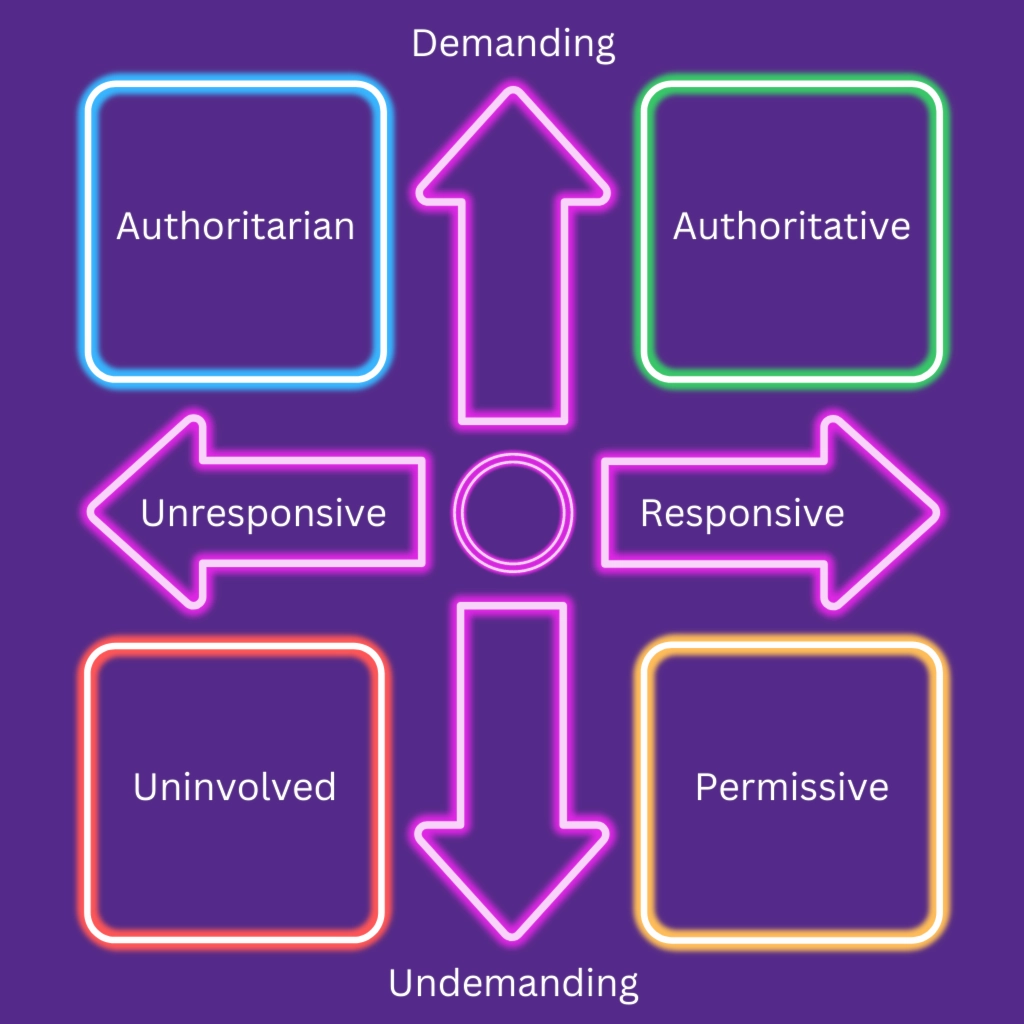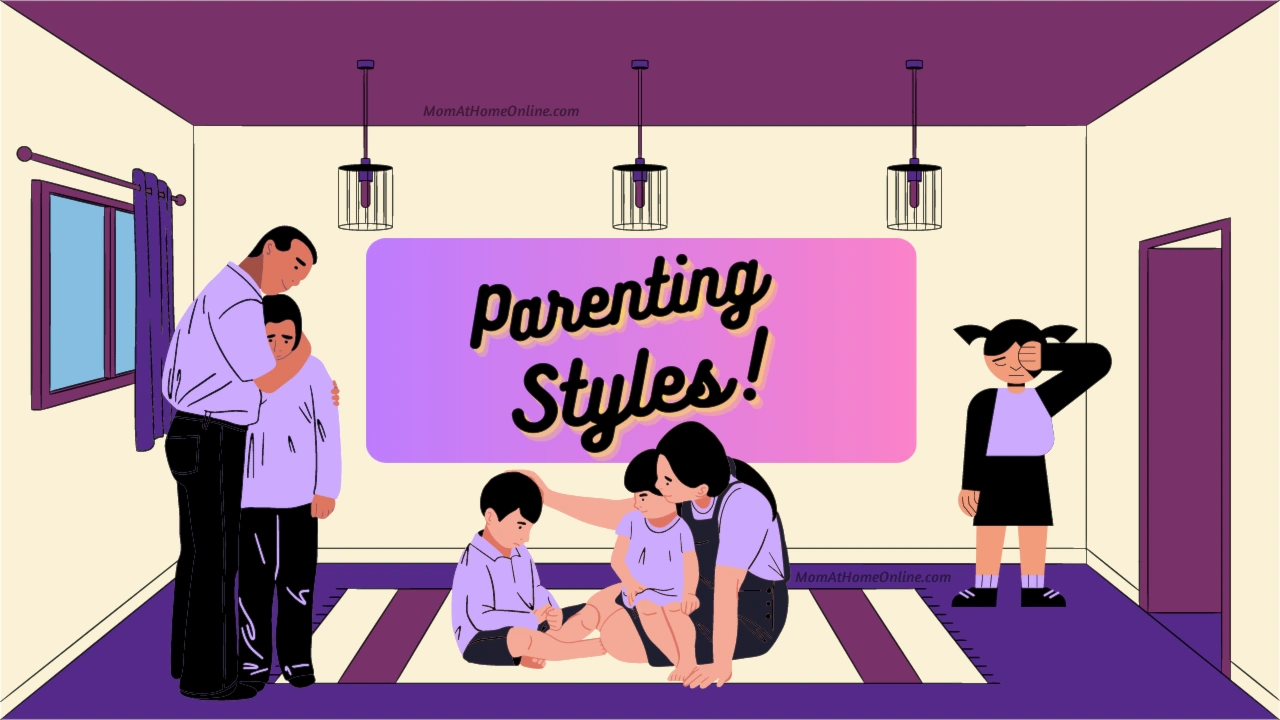- Introduction
- Overview of Parenting Styles
- What are the Four Main Types of Parenting Styles?
- How Each Parenting Style Affects Your Child’s Development
- How to Find the Right Balance for Your Child
- Among All Parenting Styles How to Choose the Right One for Your Child
- Conclusion
- Frequently Asked Questions (FAQs)
- Question for you
- Author
Introduction
Raising children is one of the most rewarding and difficult tasks in life. You want to raise your child to be happy, healthy, and successful, but how do you know which parenting style is best for them among all the parenting styles?
There are many different parenting styles, each with its own advantages and disadvantages. Some parents are more strict and authoritative, while others are more lenient and permissive. Also, some parents are more involved and supportive, while others are more distant and neglectful. Some parents are more consistent and predictable, while others are more flexible and spontaneous.
There is no one-size-fits-all answer to the question of how to choose the best parenting style for your child. However, there are some general guidelines that can help you make an informed decision based on your child’s personality, needs, and preferences. In this article, we will explore the four main types of parenting styles, their effects on children’s development, and how to find the right balance for your family.
Overview of Parenting Styles
A parenting style is a set of attitudes, beliefs, and behaviours that you use to interact with your child. It reflects how you communicate with your child, how you discipline them, how you nurture them, how you set expectations for them, and how you respond to their emotions.
Your parenting style is influenced by many factors, such as your own childhood experiences, your culture, your personality, your values, your goals, your stress level, and your child’s characteristics. However, your parenting style may also change over time as you learn from your mistakes and successes.
Your parenting style has a significant impact on your child’s development. It affects their physical, emotional, social, cognitive, and moral growth. It also shapes their self-esteem, self-regulation, resilience, motivation, creativity, empathy, and happiness.
What are the Four Main Types of Parenting Styles?
According to psychologists Diana Baumrind and Maccoby & Martin, there are four main types of parenting styles: authoritarian, authoritative, permissive, and uninvolved. These parenting styles differ in two dimensions: how much control or demand they exert on their children, and how much warmth or responsiveness they provide to their children.

Authoritarian Parenting
Authoritarian parents have a high level of control but a low level of warmth. They have strict rules and expectations for their children, and they enforce them with harsh punishments or threats. Also, they do not explain the reasons behind their rules or listen to their children’s opinions or feelings. They value obedience, conformity, and order over autonomy, creativity, and individuality.
Authoritarian parenting can be detrimental to children’s growth. Children raised by authoritarian parents are more likely to be afraid, worried, and unhappy. They may also have low self-esteem, poor social skills, and difficulty coping with stress. They may rebel against their parents or become overly dependent on them.
Authoritative Parenting
Authoritarian parents do well at combining control and warmth. They have clear rules and expectations for their children, but they also provide them with guidance, support, and feedback. Also, they explain the reasons behind their rules and listen to their children’s opinions and feelings. They value competence, independence, and cooperation over compliance, dependence, and competition.
Authoritative parenting can have positive effects on children’s development. Children raised by authoritarian parents are more self-confident, resilient, and joyful. They also have great academic achievement, high self-esteem, and decent social skills. They are able to balance their own needs and interests with those of others.
Permissive Parenting
Permissive parents have little control but a lot of affection. They have few rules and expectations for their children, and they rarely enforce them with consequences or rewards. Also, they let their kids do anything they want and make their own choices. They behave more like friends to their children than parents. They value freedom, expression, and fun over responsibility, discipline, and structure.
Permissive parenting can have mixed effects on children’s development. Children raised by permissive parents tend to be more creative, adventurous, and spontaneous. They may also have high self-esteem, good peer relationships, and a sense of humour. However, they may also lack self-control, motivation, and respect for authority. They may struggle with academic achievement, problem-solving, and emotional regulation.
Uninvolved Parenting
Uninvolved parents are low on both control and warmth. They have little interest or involvement in their children’s lives. They do not set rules or expectations for their children, nor do they provide them with guidance, support, or feedback. Also, they are indifferent or neglectful of their children’s needs and preferences. They value their own interests over their children’s well-being.
Uninvolved parenting can have detrimental effects on children’s development. Children raised by uninvolved parents tend to be more insecure, lonely, and unhappy. They may also have low self-esteem, poor social skills, and behavioural problems. They may suffer from academic failure, substance abuse, or mental health issues.
How Each Parenting Style Affects Your Child’s Development
Among all parenting styles, each style has different effects on your child’s development in various domains. Here are some examples of how each parenting style affects your child’s development
Physical Development Impact Due to Parenting Styles
- Authoritarian parents may expose their children to more health risks due to stress, fear, or abuse.
- Authoritative parents may promote their children’s health by providing a balanced diet, regular exercise, adequate sleep, and medical care.
- Permissive parents may endanger their children’s health by allowing them to eat junk food, skip physical activities, stay up late, or avoid vaccinations.
- Uninvolved parents may neglect their children’s health by failing to provide basic necessities such as food, shelter, or hygiene.
Emotional Development Impact Due to Parenting Styles
- Authoritarian parents may impair their children’s emotional development by suppressing their emotions, making them feel insecure, anxious, or depressed.
- Authoritative parents may foster their children’s emotional development by acknowledging their emotions, helping them cope with stress, and boosting their confidence.
- Permissive parents may hinder their children’s emotional development by indulging their emotions, making them feel entitled, spoiled, or immature.
- Uninvolved parents may damage their children’s emotional development by rejecting their emotions, making them feel unloved, lonely, or worthless.
Social Development Impact Due to Parenting Styles
- Authoritarian parents may inhibit their children’s social development by isolating them from peers, making them feel fearful, aggressive, or submissive.
- Authoritative parents may enhance their children’s social development by exposing them to diverse people, making them feel respectful, cooperative, or assertive.
- Permissive parents may impede their children’s social development by neglecting their social skills, making them feel selfish, rude, or dependent.
- Uninvolved parents may ruin their children’s social development by abandoning their social needs, making them feel alienated, antisocial, or rebellious.
Cognitive Development Impact Due to Parenting Styles
- Authoritarian parents may limit their children’s cognitive development by restricting their curiosity, making them feel dull, obedient, or conformist.
- Authoritative parents may stimulate their children’s cognitive development by encouraging their curiosity, and making them feel bright, inquisitive, or creative.
- Permissive parents may interfere with their children’s cognitive development by overlooking their learning, making them feel lazy, distracted, or unmotivated.
- Uninvolved parents may hamper their children’s cognitive development by ignoring their education, making them feel foolish, ignorant, or hopeless.
Moral Development Impact Due to Parenting Styles
- Authoritarian parents may hinder their children’s moral development by imposing their values, making them feel guilty, ashamed, or fearful.
- Authoritative parents may support their children’s moral development by teaching them values and making them feel responsible, honest, or compassionate.
- Permissive parents may obstruct their children’s moral development by tolerating their misbehavior, making them feel spoiled, impulsive, or immoral.
- Uninvolved parents may harm their children’s moral development by neglecting their guidance, making them feel confused, indifferent, or unethical.
How to Find the Right Balance for Your Child
As you can see, there is no perfect parenting style that works for every child. Each child is unique, and each parent is different. However, there are some general principles that can help you find the right balance for your child
Be flexible and adaptable
Your parenting style may need to change depending on your child’s age, stage, and situation. For example, you may need to be more authoritative when your child is young, more permissive when your child is a teenager, and more supportive when your child is an adult. You may also need to adjust your parenting style according to your child’s temperament, personality, and needs. For example, you may need to be more strict with a rebellious child, more lenient with a sensitive child, and more involved with a shy child.
Be consistent and predictable
Your parenting style should not vary too much from day to day or from parent to parent. Your child needs to know what to expect from you and what you expect from them. This will help them feel secure, trustworthy, and confident. You should also follow through with your rules and consequences, and praise and reward your child for their positive behavior.
Be respectful and empathetic
Your parenting style should not be based on fear, anger, or guilt. Your child needs to feel loved, accepted, and valued by you. You should also respect your child’s opinions and feelings, and try to understand their perspective and motivations. This will help them develop self-respect, empathy, and communication skills.
Be realistic and reasonable
Your parenting style should not be too high or too low in your expectations and demands for your child. Your child needs to have realistic goals and challenges that match their abilities and interests. You should also provide them with reasonable choices and consequences that are fair and appropriate for their behavior. This will help them develop self-confidence, motivation, and problem-solving skills.
Among All Parenting Styles How to Choose the Right One for Your Child
Now you know each parenting style has its own strengths and weaknesses. There is no perfect parenting style that works for every child in every situation. However, research has shown that authoritative parenting is generally the most effective and beneficial parenting style for most children in most contexts. Authoritative parenting helps your child develop into a well-rounded, competent, and happy person.
However, authoritative parenting is not always easy to practice. It requires a balance of firmness and flexibility, control and autonomy, of guidance and support. Also, it requires a lot of patience, communication, and empathy. Moreover, it may not always work for every child or every parent.
Therefore, the best way to choose a parenting style for your child is to:
Know yourself
Be aware of your own personality, values, goals, strengths, and weaknesses as a parent. Also, be honest about your own parenting style and how it affects your child. Be flexible in learning from your mistakes and improving your skill set.
Know your child
Be attentive to your child’s personality, temperament, age, needs, feelings, interests, and preferences. Also, be respectful of your child’s individuality and diversity. Be responsive to your child’s signals and feedback.
Know your situation
Be mindful of your family’s culture, background, resources, challenges, and opportunities. Also, be adaptable to your child’s environment and circumstances. Be honest with yourself about your desires and limits.
By knowing yourself, your child, and your situation, you can choose a parenting style that suits your family best. You can also adjust your parenting style as needed to meet your child’s and yourself’s changing needs.
Conclusion
Choosing the best parenting style for your child is not an easy task. It requires a lot of trial and error, patience, and wisdom. However, following the guidelines above, you can find the right balance that works for you and your child. Remember, there is no one right way to parent, but there are many ways to be a good parent.
If you’re a new parent, please check out the following blog post
Parenting Tips for New Parents: The Ultimate Guide
Frequently Asked Questions (FAQs)
Can I mix different parenting styles?
Yes, you can use different parenting styles for different situations or different children. For example, you may be more authoritarian when it comes to safety issues or more permissive when it comes to leisure activities. However, you should try to be consistent and predictable in your parenting style to avoid confusing or frustrating your child.
Can I change my parenting style?
Yes, you can change your parenting style if you think it is not working well for you or your child. You can learn from other parents, books, articles, courses, or professionals how to adopt a different parenting style. However, you should make the change gradually and gently to avoid shocking or upsetting your child.
How can I deal with a parent who has a different parenting style than me?
If you have a partner or a co-parent who has a different parenting style than you, you should try to communicate with them openly and respectfully about your differences. You should try to understand each other’s perspectives and values and find common ground. You should also try to compromise and cooperate on important issues and present a united front to your child.
How do I know if I am using the right parenting style for my child?
There is no simple way to measure if you are using the right parenting style for your child, as parenting is a complex and dynamic process that involves many factors. However, some signs that you may be on the right track are:
- Your child is happy, healthy, and successful in various domains of life, such as school, family, friends, hobbies, etc.
- Your child has a positive relationship with you and other people, based on trust, respect, and affection.
- Your child has a positive self-image and self-esteem, based on their strengths, achievements, and values.
- Your child has a positive attitude and behavior, based on their goals, interests, and morals.
How can I cope with the stress of parenting?
- Take care of yourself. Make sure you get enough sleep, eat well, and do some physical activity. This will help you feel more energized and relaxed.
- Ask for help. You don’t have to do everything by yourself. Reach out to your partner, family, friends, or other parents for support. You can also join a parenting group or class to learn new skills and share your experiences.
- Set realistic expectations. You don’t have to be a perfect parent. Accept that you will make mistakes and learn from them. Focus on what you are doing well and celebrate your achievements.
- Manage your emotions. Try to stay calm and positive when dealing with your child’s behaviour. Avoid yelling, criticizing, or blaming. Use positive reinforcement and praise instead. If you feel overwhelmed, take a break and breathe deeply.
- Have fun. Enjoy spending time with your child and doing things you both like. Play games, read books, watch movies, or go for a walk. Laughing and having fun can reduce stress and strengthen your bond.
Question for you
- After reading this blog post, how might these insights reshape your approach to better suit your child’s needs?
Please feel free to share your answer in the comment box below.
Thank you for reading this blog post. I hope you found it informative and useful. I would love to hear your thoughts and opinions on this topic. Please leave a comment below and share your feedback, suggestions, questions or anything else you want to say. I appreciate your support and engagement.
Author
Co-founder of Mom At Home Online, MBA (HR, Marketing), Blogger, Content Creator, Ex-Representative of Avon Beauty Products, Ex-Private Tutor, Experienced Music Teacher with 2 Diplomas, Trained Yoga Enthusiast, Movie Lover, and Traveler. Read more about us…
Last Modified Date:

